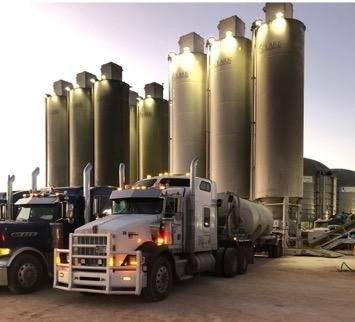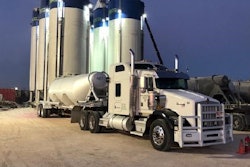"Those news stories flying around out there are very misleading and inaccurate." --Karrie Grundy, director of recruiting for Sisu Energy, speaking to NPR's "Planet Money"
I think I can safely say that Grundy wasn't talking about my own podcast interview with frac sand hauler Sisu Energy's President Jim Grundy when she told National Public Radio's "Planet Money" that news stories highlighting astoundingly high pay for "drivers" at Sisu -- a potential $730K annually! -- ignored the difference between revenue and net income for owner-operators.
 Hear Overdrive's podcast interview with Sisu Energy owner Jim Grundy about growth the company's experienced with a percentage-pay model for dry-bulk frac sand hauling via this link. Or catch it in the player at the bottom of this post.
Hear Overdrive's podcast interview with Sisu Energy owner Jim Grundy about growth the company's experienced with a percentage-pay model for dry-bulk frac sand hauling via this link. Or catch it in the player at the bottom of this post.
The NPR piece is certainly well-reported and to an extent, admirable -- and rare for a mainstream outlet -- for its breadth on a topic long promoted by big-carrier interests intent on keeping the price of hiring a driver low, and railed against by those with another principal interest in pushing rates higher. Yeah, the quote-unquote driver shortage again, back in the mainstream media at least since the National Tank Truck Carriers began to cry wolf over the specter of empty gas pumps this summer as a result of a supposed shortage of drivers in the liquid bulk segment back in late April/early this month. Coverage was spurred as part of a move to potentially exempt fuel haulers from the hours of service with COVID emergency measures. (The gods rewarded them, one might say, with a real shortage and plenty extra hauling work, and an emergency exemption for relief, with the Colonial Pipeline shutdown in the following weeks.)

[Related: The driver shortage alarm -- where are the empty shelves?]
The trucking world isn't the only business sector clamoring for labor these days, though, as local economies across the nation restart in earnest as COVID vaccinations proliferate and case numbers continue to fall fast. People are getting out into the services sector (restaurants, hotels, you name it) again, and some of those businesses have been crying shortage themselves.
Here's how it works, though: If you can't get the people you need at the price you want to pay, you're just going to have to raise the price. That's true whether you're hiring drivers or looking for a fleet to move your product -- or you need a bartender, a waiter, a line cook ...
The NPR story about trucking isn't the only mainstream one I've seen recently that goes beyond superficial whining about a shortage to really explain the fundamental supply/demand equation in labor markets all around the country and in a variety of sectors. Yet for every one of those, it feels like there are multiples doing what Sisu's Recruiting Director Karrie Grundy complained about above. A "driver shortage" pitch I got yesterday used as its teaser the specter of empty car dealer lots, of all things, as a result of a shortage of auto industry truckers. Plenty other stories pontificate on all the reasons businesses might have trouble hiring except the most obvious one -- pricing for labor being lower than what it needs to be.
[Related: Framing the trucking labor situation -- shortage at what price?]
There are other factors at play, as there always are. And with every pontificator noting this (higher unemployment compensation is keeping workers on the sidelines!) or that (people are still scared of COVID!) to explain it all away, I keep coming back to something owner-operator Jose Williams said to me last year. He was one of many owner-operators saying that owners' memory of those who were quick to take advantage when the bottom fell out would be long indeed. The sentiment is likely to apply to workers cast aside in the depths of the pandemic last year, whether company drivers or those bartenders and cooks, plenty of whom probably found their way elsewhere in the interim.
Speaking late last summer, Williams was talking about a broker that, pre-pandemic, he'd worked with extensively. As I wrote:
As business in general freight has picked back up since the beginning of the summer, that particular broker has “been calling me. All these different sales guys.” What he’s told several of them, after the experience of the second quarter, “when the crunch came down,” he said, “you weren’t offering me anything worthy of the work I’ve done for you, the excellent service. You’re trying to stick me with $1 this and 80 cents a mile that."
A far cry from any sense of loyalty or appreciation he might have expected.
"That’s not loyalty, that’s not partnership — that’s every man for himself when the time comes for it, and I don’t appreciate that.”
Get the rates you want while the getting is good.
Flipside: Prices all around are on their way up
I heard from Texas-based owner-operator Zach Beadle on the flipside of what happens when rates rise in any portion of the economy, whether the price of widgets or the price of trucking a load of lumber from Houston to Amarillo.
First off, "my insurance renewal greeted me with a $2,000 increase over last year," Beadle said, to which he "squawked" with his agent "over this incredibly unrealistic increase." Why it went up, it was claimed, was the advanced age of his 1980s Pete cabover, despite a bevy of work put into it recently, of course, documented early this year here. "After submitting pictures and documentation, and also their checking on my CSA scores and also my credit rating, they managed to drop it almost $300" from the proposed $2K annual increase.
[Related: Highway hack: High value in a parts truck]
"Whoopie!" he added. (I suspect you can sense the sarcasm there.) "I guess it’s better than nothing."
Have inflationary fears we reported on earlier this year come to life? Liability increases are nothing new in this litigious age, however.
Steel itself, on the other hand ... Regular readers may also recall Beadle's past project flatbed trailer resto. "I bought steel a day or two ago that normally would’ve cost me around $250" for another similar project that's been ongoing for a couple years now, he said. It cost him about double that.
"Also I am buying a set of tires today to hedge tire price increases coming," he said. "My tire purchasing program manager told me that with increases already levied against us we could expect upwards of 30% cumulatively by July in tire prices!"
And, he added, what more needs to be said about fuel? What more indeed. Keep costs under control the ways you know how.









